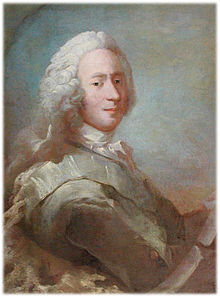Adam Gottlob Moltke
| Adam Gottlob Moltke | |
|---|---|

Portrait of Moltke by Carl Gustaf Pilo, Frederiksborg Palace
|
|
| Member of the Privy Council of Denmark |
|
|
In office 1747–1766 |
|
| Court Marshal of Denmark | |
|
In office 1743–1747 |
|
| Lord Chamberlain of Denmark | |
|
In office 1730–1743 |
|
| Personal details | |
| Born | 10 November 1710 Riesenhof, Mecklenburg, Germany |
| Died | 25 September 1792 (aged 81) Haslev, Sjælland, Denmark |
| Spouse(s) | Christiane Frederikke von Brüggemann Sophie Hedevig von Raben |
| Children | Joachim Godske Moltke |
| Parents | Joachim von Moltke Magdalene Sophia von Cothmann |
| Relatives | Adam Wilhelm Moltke (grandson) |
| Residence | Bregentved |
| Awards |
Ordre de l'Union Parfaite Fellow of the Royal Society |
Count Adam Gottlob Moltke (10 November 1710 – 25 September 1792) was a Danish courtier, statesman and diplomat, and Favourite of Frederick V of Denmark. Moltke was born at Riesenhof in Mecklenburg. His son, Joachim Godske Moltke, and his grandson, Adam Wilhelm Moltke, later served as Prime Minister of Denmark.
Adam Gottlob Greve Moltke was born 10/11 November 1710 to Joachim von Moltke and Magdalene Sophia von Cothmann. Though of German origin, many of the Moltkes were at this time in the Danish service, which was considered a more important and promising opening for the young north German noblemen than the service of any of the native principalities.
In 1722, through one of his uncles, young Moltke became a page at the Danish court, in which capacity he formed a lifelong friendship with the crown prince Frederick, later King Frederick V.
In 1730, immediately after his accession, Frederick made Moltke Lord Chamberlain and showered him with honours: making him a privy councillor, giving him the estate of Bregentved (in 1747), a count (in 1750) and presenting him the estate of Bregentved, and other lands.
As the companion of the king, Moltke's influence grew to the point that foreign diplomatists declared he could make and unmake ministers at will. Especially notable is Moltke's attitude towards the two distinguished statesmen who played the leading parts during the reign of Frederick, Johan Sigismund Schulin and The Elder Bernstorff. Schulin he revered, but Bernstorff irritated him with his affected airs of superiority. But though a Prussian intrigue was set up for the supersession of Bernstorff by Moltke, the latter, convinced that Bernstorff was the right man in the right place, supported him with unswerving loyalty.
...
Wikipedia
